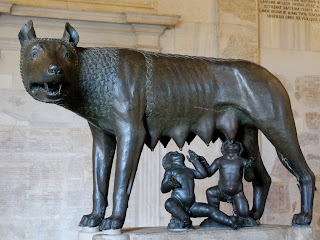What a complicated relationship we have with our fellow creatures!
When I said that, I wasn't actually thinking of our exploitation of them – important and sobering as that is – so much as how we relate to them, what we ascribe to them, what similarities we notice, or imagine, and what we as humans think we gain and learn from them.
It's an ancient story of course – not just to be saved by an animal, but nurtured, even suckled. Why wolves should be so often chosen for this role is curious, but two thousand years after this particular telling of the story, the story of protective parental wolves continues to be told, as in the Jungle Book.
Like other versions, my poem presents a speaking wolf. Having an animal thinking and talking opens the teller to the (usually critical) accusation of anthropomorphism.
But if anthropomorphism is about seeing animals as more like us, or us as more like animals; then the attribution of human characteristics to animals, and vice versa, leads to an increased understanding of both them and us. It must help create respect, and perhaps a degree of humility.
I hope I've avoided the trap of sentimentality which can lurk in books about speaking animals for children – the classic area for anthropomorphism – though the terrifying General Woundwort, Jeremy Fisher's scary experience and what Samuel Whiskers and Anna Maria did to Tom all prove that the opposite is often the case.
Listen then to the Wolf Mother, observant, competent and caring – characteristics both humans and animals share, which we could do with more of. I imagine her aware of what she doesn't know – that's definitely wisdom – when, yes of course, I'm anthropomorphising...
The Wolf Mother Speaks
I went to drink. There I found them –
such strange cubs – hairless things
no fur, no tails, no claws – with hands
as if they might be men.
I brought them back and now they suck.
I am accustomed – so, come close
drink deep, take what you need
of milk and warmth of wolf
of will of wolf, so you will grow –
for this is what I give to you –
pink twins with blunted teeth
through soft warm milk –
the taste for blood.
I the wolf mother do not know
how you will live and die
but time will tell, my suckling cubs
how you were saved
by a nameless lupine mother.
On re-reading the above, I don't want to blame the wolf, red as she may be in tooth and claw, for making the twins blood thirsty. Wolves are carnivores, as we often are, and we nurture in our own image. But I don't think they kill each other, as Romulus did Remus, and we continue to do.
And I must add how interesting it is that we all, most of us anyway, continue to drink the milk of animals...

Comments
Post a Comment